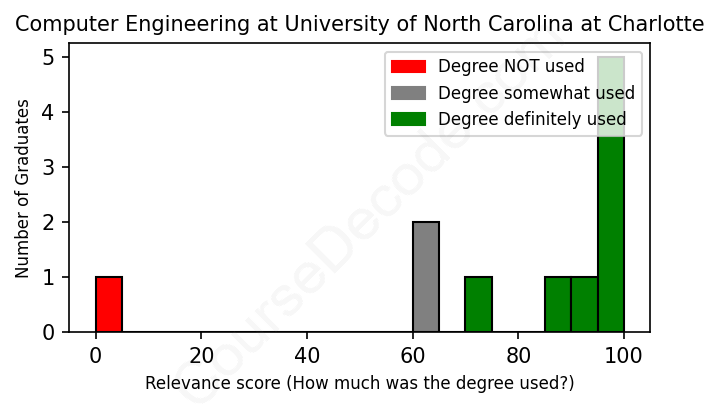
First, some facts. Of the Computer Engineering graduates from University of North Carolina at Charlotte we've analyzed , here's how many have used (or NOT used) their degree in their career:

These are estimates based on AI analysis of 11 LinkedIn profiles (see below).
The verdict? Significantly above average. Overall, with an average relevance score of 79%, Computer Engineering graduates from University of North Carolina at Charlotte have a much higher likelihood (+12%) of finding work in this field compared to the average graduate across all fields:
And for comparison, here's the chart for all profiles we've looked at across all degrees.
Also, after graduating, only 18% of these graduates have pursued further education other than another Bachelor's degree (such as a Masters degree or other), compared to the average across all profiles of 35%. This suggests a Bachelors degree is enough for most Computer Engineering graduates, and it's normal to look for work straight after graduation.
See the details:
|
Relevance score: 100% We think this person has gone into a career highly relevant to their degree. We think this person has gone into a career highly relevant to their degree.
DEGREE INFOGraduated in 2020 from University of North Carolina at Charlotte with a Bachelor in Computer Engineering. No other secondary education since. JOB HISTORY SINCE GRADUATIONFirmware Engineer - Honeywell Smart Metering EASi Jun 2020 - Present ABOUTComputer Engineer with a Mathematics Minor from the University of North Carolina at Charlotte. I have a history of leadership and organizational skills. Experience in Javascript, HTML5, CSS, JQuery, Python, VHDL and C++ with inclusion of hardware and software understanding. Looking to innovate and excel with hands-on experience in a growth-oriented organization. |
The top 10 most common jobs done by the graduates we've analyzed (ranked most common to least) are:
After looking through the LinkedIn profiles of graduates from the University of North Carolina at Charlotte who majored in Computer Engineering, it’s clear that they’ve pursued a variety of jobs. The most common types of positions include Software Engineers, Firmware Engineers, and various engineering roles involving electronics and applications. Many graduates found themselves in roles that directly relate to their degree, especially in areas like software development and hardware architecture. This shows a solid connection between their studies and professional endeavors, as jobs such as Software Design Engineer or Firmware Engineer require core skills and knowledge acquired during their studies.
However, not every job listed fits seamlessly into the Computer Engineering box. Some positions, like Assistant Dispatcher or Seasonal Sales Associate, don’t really call for any specific engineering skills and seem more like typical jobs that anyone could do regardless of their background. This suggests that while a good number of graduates found relevant work in their field, there’s a noticeable split, with some venturing into roles that don’t make full use of their Computer Engineering expertise. So, while many graduates land great engineering positions, there are also instances where they end up in more generalized roles, which might not reflect their hard-earned knowledge and skills.
Here is a visual representation of the most common words in job titles for Computer Engineering graduates (this is across all Computer Engineering graduates we've analyzed, not just those who went to University of North Carolina at Charlotte):

From the looks of it, graduates from the University of North Carolina at Charlotte with a degree in Computer Engineering generally find themselves on promising career paths. Many start their journeys right after graduation in roles that are quite relevant to their field. For instance, a good number of them land jobs as software engineers, system engineers, or firmware engineers shortly after graduating. For those who graduated in 2014 and 2016, for example, they’ve moved around between reputable companies like Wells Fargo and AGDATA, eventually growing into senior roles. You can see a clear upward trajectory where their positions are not only technical but also involve significant responsibilities.
Fast forward five to ten years after graduation, most of these individuals appear to have maintained a strong grip on their careers, often moving into roles that harness their technical expertise. Positions like Field Applications Engineer, Systems Programmer, and Application Engineer indicate that they’re still deeply involved in tech-centric roles, which is a great sign. However, there are a few outliers like the 2021 graduates who started off in more irrelevant jobs like sales associates before transitioning into tech roles, suggesting that some might take a little longer to find their niche. Overall, it seems like the majority of these graduates ultimately find meaningful work that aligns with their education in Computer Engineering, which is pretty encouraging for anyone considering this path.
Honestly, a Bachelor’s degree in Computer Engineering can be pretty challenging, and the program at University of North Carolina at Charlotte is no exception. You'll dive deep into subjects like circuits, programming, and systems design, which can get pretty intense, especially when you start juggling multiple projects and exams. It’s not the kind of degree you can coast through; you’ll need to put in a solid amount of study time and effort. That said, if you’re into tech and enjoy problem-solving, it can also be super rewarding. Just be prepared for some late nights and group projects!
Most commonly, in the LinkedIn profiles we've looked at, it takes people 4 years to finish a Bachelor degree in Computer Engineering.
Based on the job history of these Computer Engineering graduates from UNC Charlotte, it seems like they’re generally doing pretty well in terms of making money. The earlier graduates have landed solid jobs, like Software Design Engineers and Application System Engineers at big companies, which usually pay well—often over $80,000 a year, especially with a few years of experience. Even the more recent grads are finding themselves in tech roles, although some started with less promising positions like seasonal jobs or internships, which usually pay less during those early career stages. But their trajectory looks upward, especially those who quickly transitioned to roles like Software Engineers and Application Engineers shortly after graduating. Overall, it appears they have decent earning potential with plenty of room for growth in their careers!
Here is a visual representation of the most common words seen in the "about" section of LinkedIn profiles who have a Bachelor degree in Computer Engineering (this is across all Computer Engineering graduates we've analyzed, not just those who went to University of North Carolina at Charlotte). This may or may not be useful:

Here are all colleges offering a Bachelor degree in Computer Engineering (ordered by the average relevance score of their Computer Engineering graduates, best to worst) where we have analyzed at least 10 of their graduates:
| College | Score | Count |
|---|---|---|
 University of Florida University of Florida
|
95 | 18 |
 Michigan State University Michigan State University
|
94 | 10 |
 Brigham Young University Brigham Young University
|
94 | 10 |
 Penn State University Penn State University
|
92 | 14 |
 California Polytechnic State University-San Luis Obispo California Polytechnic State University-San Luis Obispo
|
91 | 14 |
 University of Central Florida University of Central Florida
|
90 | 14 |
 Georgia Institute of Technology Georgia Institute of Technology
|
90 | 14 |
 Purdue University Purdue University
|
86 | 34 |
 University of Illinois at Urbana-Champaign University of Illinois at Urbana-Champaign
|
86 | 30 |
 Iowa State University Iowa State University
|
86 | 25 |
 Texas A&M University Texas A&M University
|
85 | 17 |
 San Jose State University San Jose State University
|
85 | 16 |
 Clemson University Clemson University
|
85 | 14 |
 Dwarkadas J. Sanghvi College of Engineering Dwarkadas J. Sanghvi College of Engineering
|
85 | 10 |
 North Dakota State University North Dakota State University
|
84 | 12 |
 Savitribai Phule Pune University Savitribai Phule Pune University
|
83 | 25 |
 University of Mumbai University of Mumbai
|
82 | 43 |
 New Jersey Institute of Technology New Jersey Institute of Technology
|
81 | 11 |
 University of North Carolina at Charlotte University of North Carolina at Charlotte
|
79 | 11 |
 California State Polytechnic University-Pomona California State Polytechnic University-Pomona
|
76 | 11 |
 The University of Texas at Dallas The University of Texas at Dallas
|
76 | 18 |
 University of South Florida University of South Florida
|
69 | 10 |
 Gujarat Technological University, Ahmedbabd Gujarat Technological University, Ahmedbabd
|
55 | 13 |